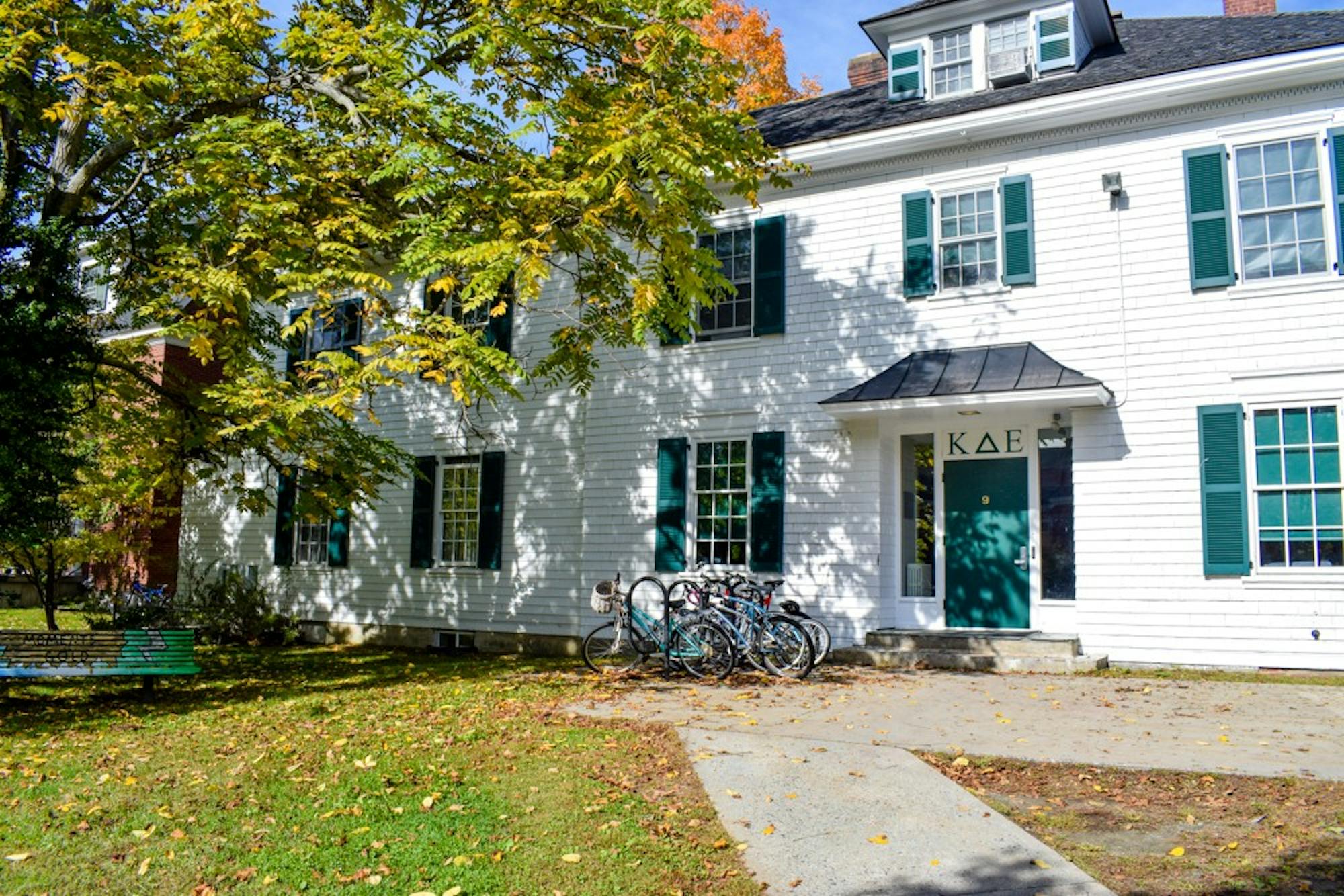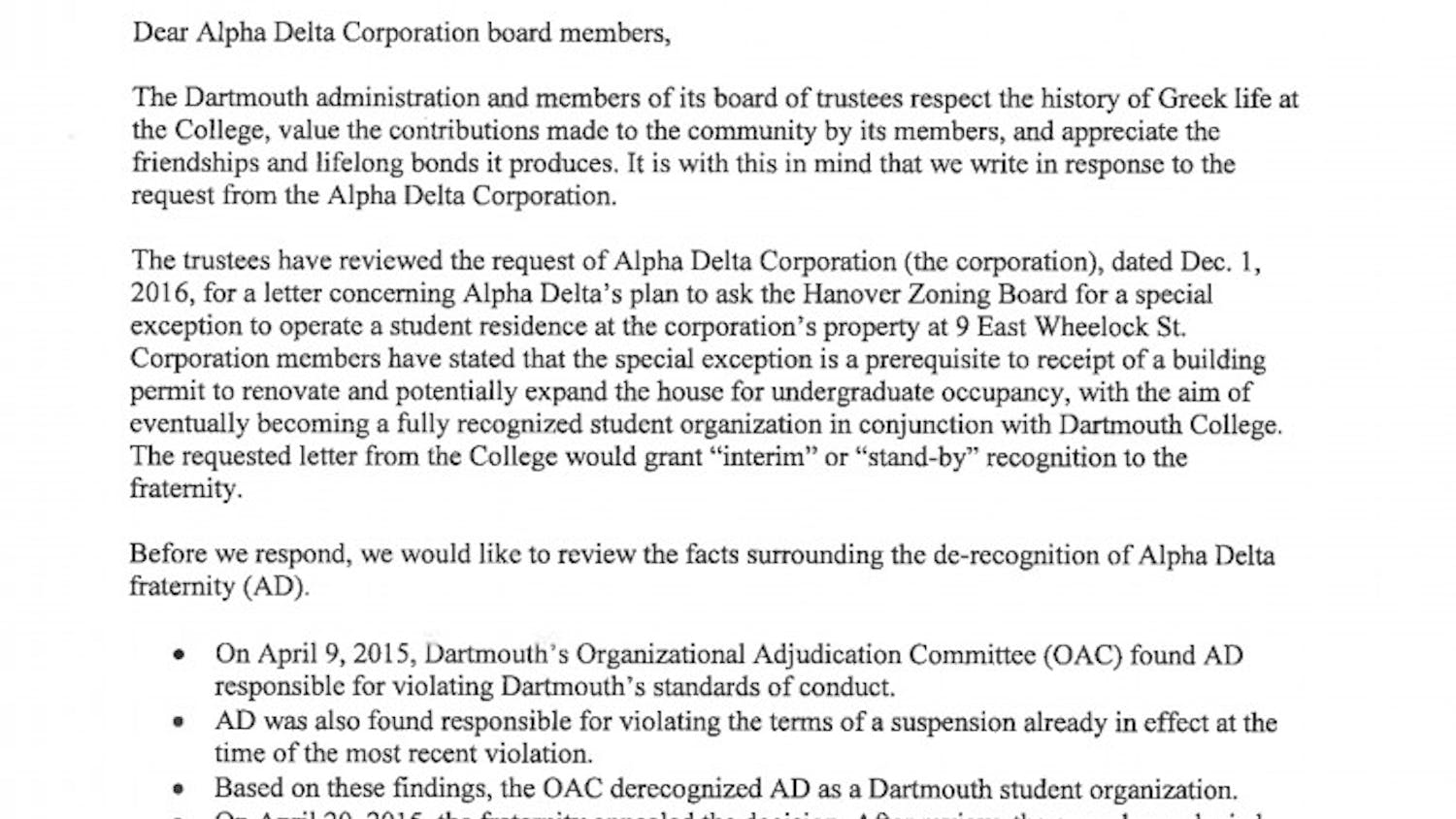As the global economy continues to experience losses, Dartmouth’s local sororities — none of which charged dues this term — are struggling to pay off their insurance premiums. A coalition of local sororities has banded together to negotiate a reduction or delay of insurance payments with the College’s administration.
According to Office of Greek Life director Brian Joyce, Greek houses are required to purchase property, general liability and directors and officers insurance. Joyce added that Greek houses can opt to purchase their own private insurance or an insurance plan through the College's broker. During a normal term, Greek houses generate income from dues and use that money to pay their insurance.
Insurance is required for Greek houses “because of [Dartmouth’s] commitment to student safety,” Joyce said. “Otherwise, any claims that came out of our organizations could threaten the personal assets of officers within the organization.”
All of the College’s local sororities — Chi Delta, Epsilon Kappa Theta, Kappa Delta Epsilon and Sigma Delta — are on Dartmouth’s insurance plan. This term, the premiums associated with this plan surged in price, as property and general liability rates rose by 10 and 15 percent, respectively. In addition to the premium, a 1.5 percent finance charge, or late fee, applies to the College’s payment plan, according to Sigma Delt president Gigi Gunderson ’21.
Gunderson said that negative impacts on the insurance market amid COVID-19 have been the main cause of higher-than-expected premiums. However, she added that some sororities had not previously ensured that all new members from each rush cycle signed new member contracts in OrgSync. This practice distorted sorority membership counts and disproportionately lowered insurance rates, according to Gunderson. Over the past few years, the Office of Greek Life has corrected its records and consequently, insurance premiums have increased even more than they normally would have.
Dartmouth’s four local sororities have expressed concern about the affordability of their insurance plans. This term, all four houses chose not to charge dues — their main source of income for chapter operating expenses. During a typical term, if a member of a Greek organization qualifies for reduced or waived dues, the Inter-Sorority Council can provide financial assistance to cover the house’s losses. However, the ISC cannot provide aid to local sororities this term, as those sororities opted not to formally charge dues, Gunderson said.
Gunderson said that the presidents and treasurers of all four local sororities have written to the College administration to request assistance. Gunderson explained that they hope to eliminate the late fee associated with their payment plan for this and next year, but it is uncertain what will be feasible.
She added that she and Sigma Delt treasurer Maya Recanati ’21 have been in contact with the Office of Greek Life and the Payroll Office.
“I’ve been delving into the minutia with [Recanati], and they have all been incredibly helpful in pointing us to resources and advocating on our behalf both to our insurance company and to the College,” Gunderson said. “We really want to hear from [Associate Dean for Student Life] Eric Ramsey in terms of any sort of financial relief for our chapters, as well as that late fee.”
The coalition of sororities is set to meet with Joyce and Ramsey this coming week.
If the College does not assist Greek houses, houses may turn to alumni networks to solicit donations, although chapters of national organizations have a larger pool of potential donors.
Megan Ungerman ’21, the president of EKT, said that houses may also use money from their savings to pay insurance bills this term. However, Ungerman cautioned that sororities would rather not deplete their savings, especially since it is unclear how long irregular College operations will last.
“We’re not going to charge dues while we’re not on campus,” Ungerman said. “But we’re going to have to keep paying these insurance bills, so that’s a concern.”
Different houses are facing varying circumstances depending on their membership numbers. According to Ungerman, EKT pays a lower general liability insurance premium — the house owes $6,500 for the 2020-2021 year, while other houses owe far more — because it has fewer members.
“Still, I think it’s ridiculous we’re expected to pay it all upfront,” Ungerman said. “If we opt into a payment plan, we get [a late fee]. We thought we would be able to pay a little now and the rest when we are actually generating income, but it wasn’t as lenient as we hoped.”
Gunderson emphasized that, regardless of the circumstances, the sororities will be able to continue operating. She said that the reason all houses have a safety net in the first place is to protect against unpredictable losses.
“[Sigma Delt] is looking into ways we can be creative with [how to pay] our expenses in the upcoming months,” Gunderson said. “I hope our conversation [with the administration] is the beginning of a continued conversation of how we can work with the College throughout this year and next year to ensure we have a plan to be financially sustainable.”




